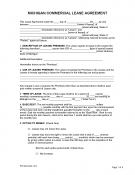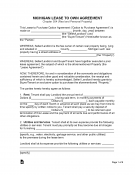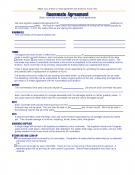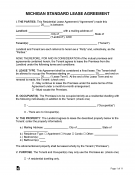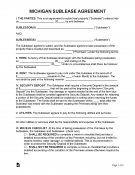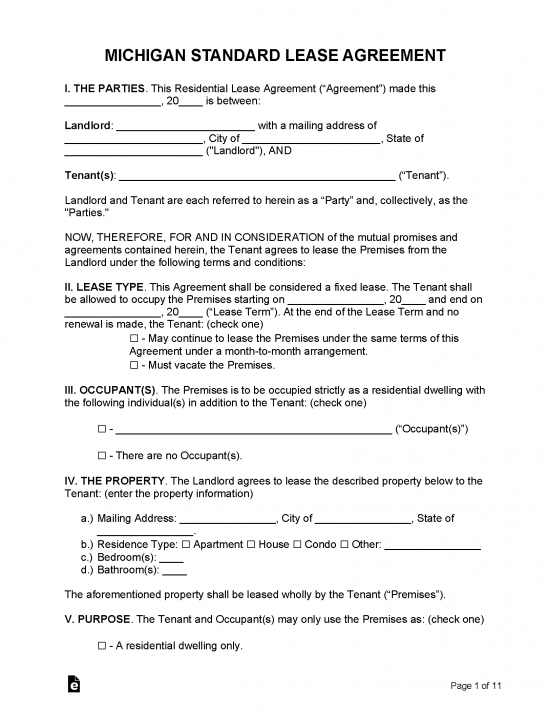Michigan lease agreements are contracts between a landlord and tenant that govern the tenant’s lease of a landlord’s property. The agreement will specify the monthly rent, responsibility for utilities, and other obligations of the parties. Both the landlord and the tenant should keep a copy of the lease agreement, and refer to it in the event of a disagreement.
Contents
- Michigan Lease Agreements: By Type (6)
- Landlord-Tenant Laws
- Handbooks and Guides
By Type (6)
- Commercial Lease Agreement
- Month-to-Month Lease Agreement
- Rent-to-Own Lease Agreement
- Roommate Lease Agreement
- Standard Lease Agreement
- Sublease Agreement
Download: Adobe PDF, MS Word, Rich Text Format
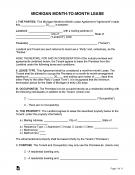 Month-to-Month Lease Agreement
Month-to-Month Lease Agreement
Download: Adobe PDF, MS Word, Rich Text Format
Download: Adobe PDF, MS Word, Rich Text Format
Download: Adobe PDF, MS Word, Rich Text Format
Download: Adobe PDF, MS Word, Rich Text Format
Download: Adobe PDF, MS Word, Rich Text Format
Landlord-Tenant Laws
Statutes – Chapter 554 §§ 601-616 (Landlord and Tenant Relationships), Chapter 554 §§ 631-641 (Truth in Renting Act)
Required Disclosures (6)
Domestic Violence Victims – A landlord must either include the following into the rental contract, hung it as a written notice on the property, or deliver to tenants:
NOTICE: A tenant who has a reasonable apprehension of present danger to him or her or his or her child from domestic violence, sexual assault, or stalking may have special statutory rights to seek a release of rental obligation under MCL 554.601b.
Inventory Checklist – This form, which evaluates the condition of the property when a tenancy begins, must be returned to the landlord within seven (7) days of the tenant’s occupancy for any property in which the landlord requires a security deposit (§ 554.608).
Lead-Based Paint Disclosure – Federal law mandates that landlords disclose the hazards of lead-based paints to all tenants embarking on leases of dwelling units erected before 1978.
Notice Information – A lease agreement must contain an address where the tenant may send legal notices (§ 554.634).
Truth in Lending Act – All contracts must contain the following in 12-point font and no less than 1/8 inch in height (§ 554.634).
NOTICE: Michigan law establishes rights and obligations for parties to rental agreements. This agreement is required to comply with the Truth in Renting Act. If you have a question about the interpretation or legality of a provision of this agreement, you may want to seek assistance from a lawyer or other qualified person.
Security Deposit Receipt – Landlords are required to provide tenants with information about their security deposit during the tenancy, including the financial institution where the funds are located. The receipt must include this admonition, in at least 12 point font which must be at least 4 points larger than the rest of the document and in bold-faced lettering (§ 554.603):
NOTICE: You must notify your landlord in writing within 4 days after you move of a forwarding address where you can be reached and where you will receive mail; otherwise your landlord shall be relieved of sending you an itemized list of damages and the penalties adherent to that failure.
Security Deposit Laws
Maximum Amount ($)
A landlord may require a security deposit no higher than one-and-a-half times the monthly rent (§554.602)
Returning to Tenant
The security deposit, thought kept by the landlord, is the property of the tenant, and must be returned, with applicable interest, to the tenant within thirty (30) days of the termination of a tenancy. A landlord may retain a portion of a security deposit to account for rent owed by the tenant, or repair of damage done to the unit that is outside the normal course of habitation. In the case of damage to the property, the landlord’s estimate must be based on an inspection completed after the tenant has moved out, and using the property condition statement filled out at the beginning of the tenancy. If the landlord is to retain any amount, the landlord must send, also within the thirty-day time period, a written itemization of the amounts. The tenant must respond to this notice within seven (7) days to dispute any claim. It is the tenant’s responsibility to provide a forwarding address for this notice and other matters within four (4) days of the termination of the tenancy (§§ 554.604 – 554.611).
When is Rent Due? (grace period)
Michigan laws do not specify a date on which rent is due, which means that tenants and landlords may decide on a rent due date in the rental agreement. There is also no statutorily provided grace period.
Eviction Notice (non-payment)
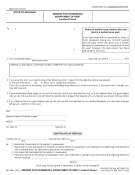 7-Day Notice to Pay or Quit – If a tenant fails to pay rent on the date it is due, a landlord or an agent of the landlord may serve this form, sometimes known as Form DC 100, on the tenant, stating that the tenant has seven (7) days to pay the amount owed, otherwise the landlord may begin the process of evicting the tenant (§ 600.5714).
7-Day Notice to Pay or Quit – If a tenant fails to pay rent on the date it is due, a landlord or an agent of the landlord may serve this form, sometimes known as Form DC 100, on the tenant, stating that the tenant has seven (7) days to pay the amount owed, otherwise the landlord may begin the process of evicting the tenant (§ 600.5714).
Download: Adobe PDF
Maximum Fees ($)
Late Rent Penalties
The Michigan Compiled Laws do not set a maximum fee that may be imposed for delivering a late rent check. However, the fee must be named in the lease agreement, and should be reasonable.
NSF Checks
If a landlord provides written notice to a tenant that a rent check was provided with insufficient funds, the landlord may charge tenants up to $25 if the amount owed is paid within seven (7) days of providing the notice, and up to $35 if the amount owed is paid between eight (8) and thirty (30) days (§600.2952).
Tenant’s Unclaimed Property
Michigan law does not define a landlord’s obligations regarding personal property left behind by tenants. However, best practice is to gather property that appears to be valuable, store it in a safe place, and notify the tenant. Landlords are generally able to bill tenants for the cost of storing the personal property, but may have to release tools of a trade, medical supplies, and childcare items regardless of whether the tenant pays what is owed. If the tenant does not respond to the notice about the personal property within a reasonable time, the landlord can dispose of the property, including selling it to recoup money owed by the tenant to whom the property belonged.
